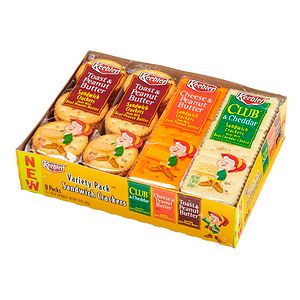Over the past few weeks there have been grumblings and heated discussions across the food allergy community because of Kellogg’s decision to add peanut flour to some of their cookies. Kellogg’s wishes to use peanut flour to fortify their Keebler and Austin branded snack crackers with protein and lower the carbohydrate content, making their snack crackers healthier for the general public.
The initial reaction from many peanut allergy parents was outrage with SnackSafely.com, an advocacy group formed in 2011, quickly launching a petition appealing to Kellogg’s to reverse their decision. The SnackSafely petition states that “While we understand your interest in raising the protein and lowering the carbohydrate content of your products in as cheaply a manner as possible, doing so using peanuts – the allergen most responsible for triggering anaphylaxis, an allergic reaction that can result in horrific consequences including death – is unethical and irresponsible.” There are currently more than 16,500 signatures urging Kellogg’s NOT to add peanut flour to their products.

In response to this petition, Lily Roth, the blogger behind Food Allergy Survival Guide, recently published an An Open Letter To The Food Allergy Parents Petitioning Kellogg’s from the perspective of a teen with food allergies. Her letter states:
“Parents who petition things like peanut flour in one brand of sandwich crackers unintentionally make life harder for their food allergic kids. Kellogg’s is changing their ingredients in an effort to champion healthier products and many people view food allergy parents as standing in the way of their mission that will ultimately impact many more kids than the 3 million kids with peanut allergies. People view this petitioning the same way they view food allergy parents as standing in the way of their child’s school party or peanut butter and jelly sandwich at lunch. It adds more stigma and makes people less likely to consider legitimate requests. But what is most detrimental is what it does to us kids with food allergies. Growing up, everything is handed to us to make us safe. We are sat at peanut free tables, have a safe box of treats and learn to expect that life is going to be adapted to fit our needs. The truth is life isn’t like that.”
Lily suggests an alternative course of action for food allergy parents to use this experience as a teachable moment for your children with food allergies instead of using efforts on petitioning the inevitable addition of peanut flour to Kellogg’s snack crackers.
“Teach your child that ingredients change all the time and it is important to check foods every time they eat them, even if they were previously safe. Teach your child the importance of adaptation and accommodation. Most of all, use it to teach them that it isn’t worth getting upset about little things. Living with food allergies, it is so easy to get upset and frustrated over the frustrations of managing a life-threatening condition that it is important to remember that getting upset over every little sandwich cracker type situation is only going to lead to a life of frustration and disappointment.”
The SnackSafely team admits “We do not speak for the allergic community. We made our statement to Kellogg’s and invite like-minded individuals to join us in our petition. As such, the individuals signing the petition (and those who choose not to) are speaking for themselves.” They further explain their reasoning behind their petition that “citizens blessed to live in a democracy should use their collective voices to advocate change where they see it necessary, whether to protect the many or the few. That’s why we created this as a petition, so those that want to add their voice to our concerns can do so and others can abstain.”

This issue appears to have split the food allergy community’s proverbial cracker in half. Both sides of the debate have the common goal to keep people with food allergies safe. Which side of the cracker are you on?





COMMENTS